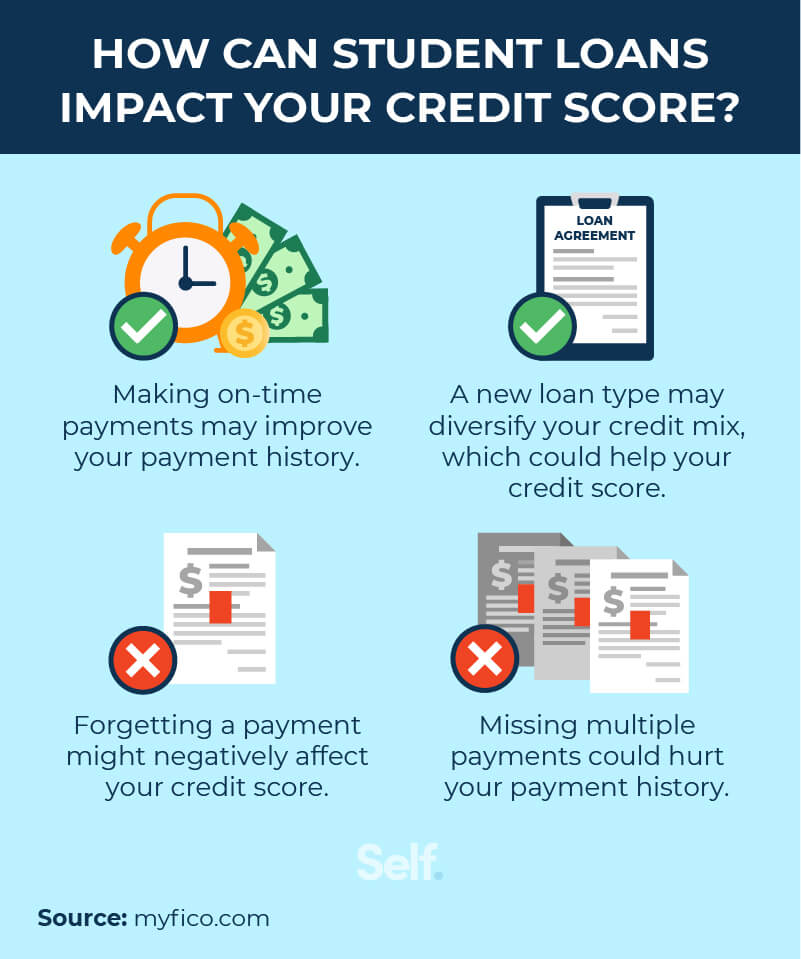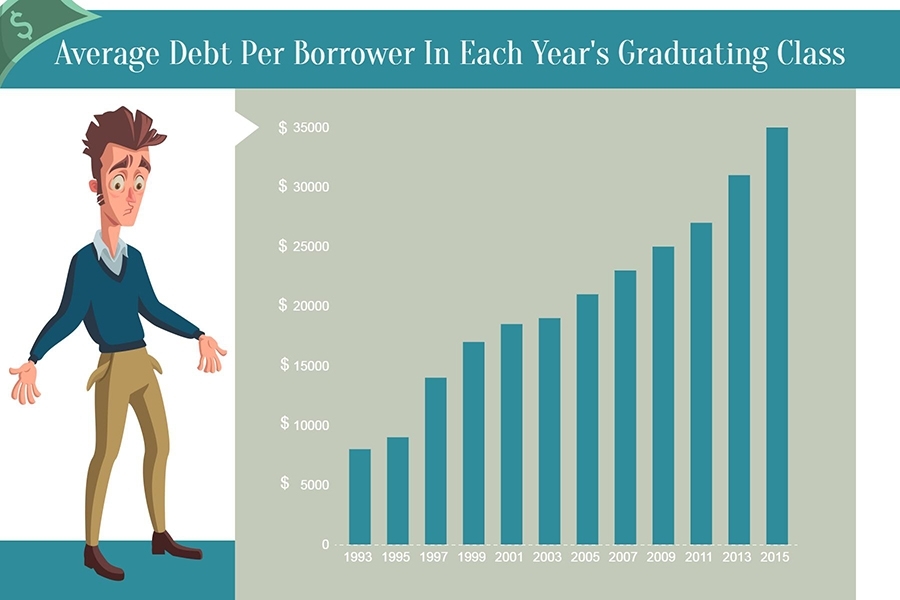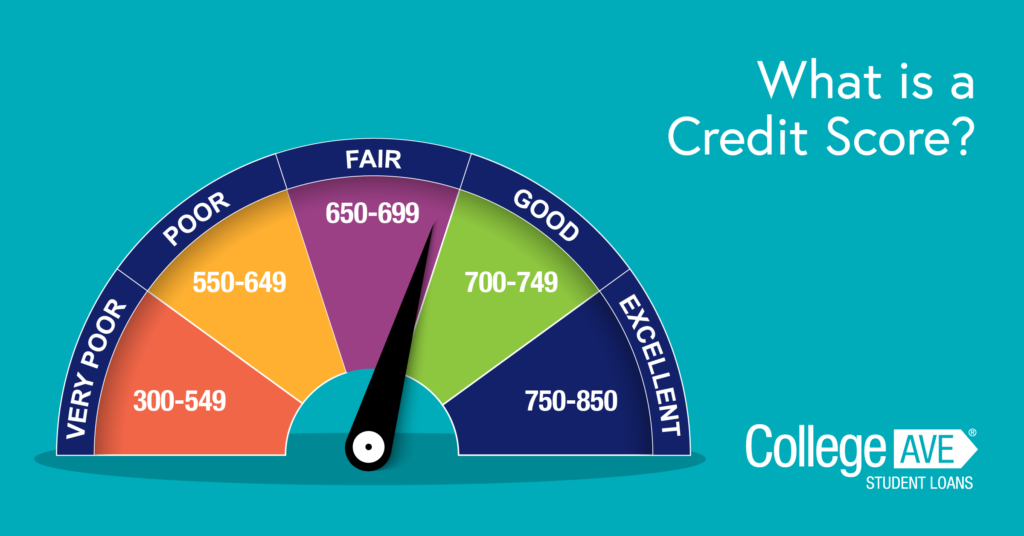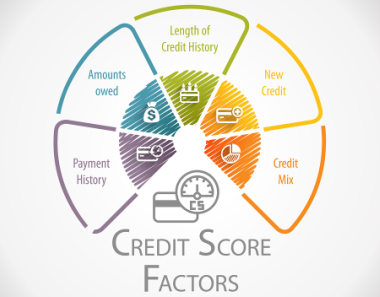Have you ever wondered how your student loans can affect your credit score? It’s a topic that often goes overlooked, but understanding the impact of student loans on your credit is essential for managing your financial future. In this article, we’ll dive into the details of how student loans can affect your credit score and provide you with some tips on how to handle them effectively. From understanding the basics of credit scores to debunking common myths, we’ll cover it all. So stay tuned to learn more about this important topic and how it can impact your financial well-being. In this article, we’ll explore the various factors that student loans can have on your credit score and delve into the ways you can navigate this complex landscape. Whether you’re a recent graduate looking to build credit or someone who’s been struggling with student loan debt for years, understanding the ins and outs of this topic is crucial. We’ll address common questions such as how late payments can affect your credit score, whether it’s better to hire a repair company or handle things on your own, and what strategies you can use to negotiate with creditors. By the end of this article, you’ll have a better understanding of how to handle student loans and protect your credit score in the process.

This image is property of images.ctfassets.net.
Understanding Student Loans
Student loans are a common form of financial aid that many individuals rely on to pursue higher education. There are different types of student loans available, each with its own terms and conditions. Understanding these types of loans is important in order to make informed decisions about borrowing for education.
Different types of student loans
There are two main types of student loans: federal student loans and private student loans. Federal student loans are offered by the government and have fixed interest rates, flexible repayment options, and certain borrower benefits such as deferment and forbearance. Private student loans, on the other hand, are offered by private lenders and have varying interest rates and repayment terms.
Federal student loans include Direct Subsidized Loans, Direct Unsubsidized Loans, and Parent PLUS Loans. Direct Subsidized Loans are available to undergraduate students based on financial need, and the government pays the interest while the borrower is enrolled in school. Direct Unsubsidized Loans are available to both undergraduate and graduate students, and the borrower is responsible for paying the interest. Parent PLUS Loans are available to parents of dependent undergraduate students and allow parents to borrow the full cost of attendance, minus any other financial aid received.
Private student loans are offered by banks, credit unions, and other financial institutions. The interest rates and repayment terms for private student loans vary depending on the lender and the borrower’s credit history. Private loans may require a cosigner if the borrower does not have a strong credit history or income.
Importance of student loans in education
Student loans play a crucial role in helping individuals access higher education. They provide the necessary funds to cover tuition fees, books, living expenses, and other educational costs that can be prohibitive for many students and their families. Without student loans, many individuals would not be able to pursue their educational goals and fulfill their dreams of obtaining a degree.
Student loans allow students to focus on their studies without the burden of immediate financial stress. They provide flexibility in terms of repayment options, allowing borrowers to defer payments while in school or during periods of financial hardship. Student loans also have relatively low interest rates compared to other forms of consumer loans, making them a more affordable option for financing education.
Repayment options for student loans
Once a borrower completes their education or drops below half-time enrollment, they will typically have a grace period before they have to start repaying their student loans. The grace period is usually six months for federal student loans.
For federal student loans, there are several repayment options available. The standard repayment plan is the default option and involves fixed monthly payments for up to 10 years. There are also income-driven repayment plans that base monthly payments on the borrower’s income and family size. These plans can provide more affordable monthly payments but may extend the repayment period.
For private student loans, repayment options vary depending on the lender. Some lenders offer flexible repayment plans similar to federal loans, while others may have fixed repayment terms. It’s important for borrowers to carefully review the terms and conditions of their private loans and discuss repayment options with their lender.
Impact of Student Loans on Credit Scores
Taking on student loans can have a significant impact on an individual’s credit scores. Credit scores are a numerical representation of an individual’s creditworthiness and are used by lenders, landlords, and other entities to assess the risk of lending or extending credit to that individual.
How student loans affect credit scores
When a borrower takes out a student loan, it is reported to the credit bureaus as a new account. This new account, along with the borrower’s payment history on the loan, contributes to their credit scores.
If the borrower makes their loan payments on time and in full, it can have a positive impact on their credit scores. Timely payments demonstrate responsible financial behavior and can help build a positive credit history.
On the other hand, if the borrower falls behind on their loan payments or defaults on their loans, it can have a negative impact on their credit scores. Late payments, delinquencies, and defaults are all negative marks on a credit report and can lower credit scores significantly.
Positive and negative effects on credit scores
A well-managed student loan can have a positive impact on credit scores by establishing a positive payment history. Making timely payments each month and paying off the loan in full can demonstrate responsible financial behavior and boost credit scores.
However, if a borrower misses payments or defaults on their student loans, it can have a detrimental effect on their credit scores. Late payments, delinquencies, and defaults are negative marks that stay on a credit report for seven years, and they can significantly lower credit scores. This can make it more difficult for borrowers to obtain credit in the future and can result in higher interest rates and limited borrowing options.
Factors that influence credit scores
Credit scores are influenced by various factors, including payment history, amounts owed, length of credit history, new credit, and types of credit used. For student loan borrowers, payment history and amounts owed are particularly important factors that can impact credit scores.
Payment history accounts for approximately 35% of a credit score, making it one of the most significant factors. Consistently making on-time payments can have a positive impact on credit scores, while late payments or defaults can have a negative impact.
Amounts owed accounts for approximately 30% of a credit score. This factor takes into consideration the amount of debt a borrower owes compared to their available credit. For student loan borrowers, keeping loan balances low relative to their credit limits can help improve credit scores.
Managing Student Loans to Improve Credit Scores
Managing student loans effectively can help borrowers improve their credit scores over time. By following certain strategies and best practices, borrowers can minimize the impact of their loans on their credit and work towards improving their creditworthiness.
Effectively managing student loan payments
Making timely payments on student loans is crucial for maintaining good credit and improving credit scores. Setting up automatic payments or reminders can help ensure that payments are made on time each month. It’s also important to budget and prioritize loan payments to avoid falling behind.
If a borrower is struggling to make their loan payments, they should reach out to their loan servicer or lender to explore options for alternative repayment plans or deferment/forbearance. It’s important to communicate with the lender as early as possible to avoid defaulting on the loan.
Avoiding default and delinquency
Defaulting on a student loan can have severe consequences on credit scores and overall financial health. Default occurs when a borrower fails to make payments for an extended period, usually 270 days or more on federal loans.
To avoid default, borrowers should make every effort to stay current on their loan payments. If they’re unable to make the full payment, contacting the loan servicer or lender to discuss alternative repayment options is essential. Loan servicers may be able to provide temporary relief by offering deferment or forbearance options.
Delinquency, which occurs when a loan payment is past due but not yet in default, can also negatively impact credit scores. It’s important to address delinquencies promptly and work with the loan servicer or lender to establish a payment plan that is manageable.
Repayment strategies to minimize impact on credit scores
Certain repayment strategies can also help minimize the impact of student loans on credit scores. For example, borrowers can consider consolidating their loans to simplify repayments and potentially lower monthly payments. However, it’s important to research and understand the implications of loan consolidation before proceeding.
Another strategy is to make extra payments towards the principal balance of the loan. By paying more than the minimum monthly payment, borrowers can reduce the overall interest paid over the life of the loan and pay off the loan faster. This can improve credit scores by reducing the amount owed relative to the credit limit.
Credit Repair for Student Loan Borrowers
Taking steps to repair credit can be beneficial for student loan borrowers who may have experienced negative impacts on their credit scores. Credit repair involves identifying and addressing inaccuracies on credit reports, negotiating with lenders, and improving creditworthiness through responsible financial habits.
Checking your credit report for errors related to student loans
The first step in credit repair is to obtain a copy of your credit report from each of the three major credit bureaus – Equifax, Experian, and TransUnion. Review your credit reports carefully to ensure that all the information, including student loans, is accurate and up to date.
If you find any errors or discrepancies related to your student loans, such as missing payments or incorrect loan balances, you have the right to dispute them with the credit bureaus. Submitting a dispute can help correct inaccuracies and improve your credit report.
Disputing inaccurate information
When disputing inaccurate information on your credit report, it’s important to gather supporting documentation that proves the inaccuracy. This may include payment receipts, loan statements, or correspondence with your loan servicer or lender.
Submit a dispute to the credit bureaus in writing, clearly stating the inaccurate information and providing the supporting documentation. The credit bureaus are required to investigate the dispute within 30 days and remove any inaccuracies if they are unable to verify them.
Negotiating with lenders for better repayment terms
If you’re struggling to afford your student loan payments, it may be worth reaching out to your loan servicer or lender to discuss alternative repayment options. In some cases, lenders may be willing to modify the repayment terms to make them more affordable.
Options for alternative repayment may include income-driven repayment plans, extended repayment plans, or loan consolidation. It’s important to thoroughly research and understand the terms and conditions of any repayment options before agreeing to them.

This image is property of nationalcreditfederation.com.
Dealing with Student Loan Default and Its Impact on Credit Scores
For borrowers who are already in default on their student loans, dealing with the consequences and finding a resolution is crucial. Defaulting on student loans can have severe and long-lasting impacts on credit scores and overall financial health.
Understanding the consequences of student loan default
Defaulting on a student loan can have serious consequences. Not only does it negatively impact credit scores, but it can also result in wage garnishment, tax refund interception, and even legal action. Defaulted loans may be sent to collections agencies, leading to additional fees and expenses for the borrower.
Defaulted loans can also prevent borrowers from accessing additional financial aid or qualifying for certain types of employment. It’s important to understand the full scope of the consequences of defaulting before taking any action.
Options for resolving defaulted student loans
There are several options available for resolving defaulted student loans. One option is loan rehabilitation, which involves making a series of on-time payments to bring the loan out of default. Once the loan is rehabilitated, it is removed from default status, and the borrower regains eligibility for borrower benefits and repayment options.
Another option is loan consolidation, which involves combining multiple federal loans into one new loan with a single monthly payment. Consolidation can help simplify the repayment process and provide an opportunity to bring the loan out of default.
In some cases, borrowers may be eligible for loan forgiveness or discharge programs. These programs, such as Public Service Loan Forgiveness or Total and Permanent Disability Discharge, can eliminate the remaining balance of the loan under certain circumstances. It’s important to research and understand the eligibility criteria for these programs.
Rebuilding credit after default
Rebuilding credit after defaulting on student loans can be a challenging process, but it is possible with time and dedication. The first step is to bring the loans out of default by following the appropriate resolution option, such as loan rehabilitation or consolidation.
Once the loans are out of default, it’s important to make consistent, on-time payments to rebuild a positive payment history. Additionally, responsible use of other forms of credit, such as credit cards or installment loans, can help establish a positive credit history and improve credit scores over time.
Student Loan Forgiveness and Its Effect on Credit Scores
Student loan forgiveness programs provide a valuable opportunity for borrowers to have a portion or all of their student loans forgiven. These programs can help alleviate the financial burden of student loans, but they can also have an impact on credit scores.
Eligibility criteria for student loan forgiveness
Each student loan forgiveness program has its own eligibility criteria. For example, the Public Service Loan Forgiveness (PSLF) program requires borrowers to work full-time for a qualifying public service organization and make 120 qualifying monthly payments under an income-driven repayment plan.
Other forgiveness programs, such as Teacher Loan Forgiveness or Perkins Loan Cancellation, have their own specific eligibility requirements. It’s important for borrowers to thoroughly research and understand the criteria for each program to determine whether they qualify.
Impact of forgiveness programs on credit scores
When a borrower’s student loans are forgiven, it can have both positive and negative impacts on their credit scores. On one hand, having a portion or all of the loans forgiven can reduce the amount owed relative to the credit limit, which can improve credit scores.
On the other hand, the forgiveness of the loans may be reported as income for tax purposes, which could increase the borrower’s taxable income for the year of forgiveness. This increase in taxable income could temporarily lower credit scores, but it should not have a long-lasting impact.
Pros and cons of pursuing loan forgiveness
There are several pros and cons to consider when pursuing loan forgiveness. The main advantage is that loan forgiveness can significantly reduce or eliminate the burden of student loan debt, allowing borrowers to achieve financial freedom more quickly.
However, pursuing loan forgiveness programs typically requires meeting certain eligibility criteria and making consistent payments over an extended period. This may not be feasible for all borrowers, especially those with high levels of debt and limited income. It’s important to carefully weigh the pros and cons and consider all repayment options before deciding to pursue loan forgiveness.

This image is property of cdn.collegeavestudentloans.com.
Alternatives to Student Loan Repayment
While student loan repayment is a common way to finance education, there are alternative options available to minimize or avoid taking on excessive student loan debt.
Education grants and scholarships
One alternative to student loan repayment is to seek out education grants and scholarships. Grants and scholarships are forms of financial aid that do not have to be repaid, making them an attractive option for students who qualify. They are typically awarded based on academic achievement, athletic ability, or other criteria set by the grant or scholarship provider.
Students can research and apply for grants and scholarships through their school’s financial aid office, online databases, and various organizations that offer funding for education. By securing grants and scholarships, students can reduce their reliance on student loans and potentially graduate with less debt.
Work-study programs and part-time jobs
Work-study programs and part-time jobs can also help offset the cost of education and reduce the need for student loans. Work-study programs provide students with part-time employment on or off-campus, allowing them to earn money to help pay for education expenses.
Part-time jobs, whether related to the field of study or not, can also provide income to cover educational costs. By combining work-study programs or part-time jobs with other forms of financial aid, students can reduce their overall borrowing and minimize the impact on their credit scores.
Income-driven repayment plans
For borrowers who are already facing significant student loan debt, income-driven repayment plans can be an alternative to traditional repayment. These plans base monthly payments on the borrower’s income and family size, making them more affordable for individuals with limited income.
Income-driven repayment plans typically extend the repayment period beyond the standard 10-year term, resulting in a lower monthly payment. While this can be beneficial in terms of cash flow, it’s important to understand that the extended repayment period may result in paying more interest over time.
Seeking Professional Help for Student Loan Management
Managing student loans and credit scores can be complex, and in some cases, it may be beneficial to seek professional help. Credit counseling services, student loan consultants, and loan consolidation companies can provide guidance, assistance, and support in navigating the challenges of student loan management.
Benefits of credit counseling services
Credit counseling services can provide valuable assistance to borrowers struggling with their student loans and credit scores. These services offer personalized financial counseling, budgeting assistance, and debt management plans to help borrowers get back on track financially.
Credit counselors can also negotiate with lenders on behalf of borrowers to establish more manageable repayment terms and potentially reduce interest rates. They provide expert advice and guidance on credit repair strategies and help borrowers develop a plan to achieve their financial goals.
Working with student loan consultants
Student loan consultants specialize in helping borrowers understand their student loan options and develop a repayment strategy that suits their individual needs. They can help borrowers navigate complex student loan programs, determine eligibility for forgiveness or repayment plans, and provide guidance on loan consolidation.
Student loan consultants are knowledgeable about the intricacies of student loans and can help borrowers make informed decisions about their loan management. They can also advocate on behalf of borrowers to ensure their rights are protected and that they have access to all available resources and opportunities.
Choosing a reputable loan consolidation company
For borrowers with multiple student loans, loan consolidation can be a useful strategy to simplify repayments and potentially lower monthly payments. When considering loan consolidation, it’s important to choose a reputable company to ensure that the process is smooth and reliable.
Research loan consolidation companies thoroughly, read reviews, and check for any complaints with consumer protection agencies. It’s important to understand the terms and conditions of the consolidation loan, including interest rates, repayment terms, and borrower benefits.

This image is property of www.credit.com.
Maintaining Good Credit Habits while Managing Student Loans
While managing student loans and credit scores may present challenges, it’s important for borrowers to maintain good credit habits. By following certain practices and habits, borrowers can minimize the negative impact of student loans on their credit scores and build a strong credit history over time.
Importance of timely payments
Making timely payments on student loans is essential for maintaining good credit. Late or missed payments can have a significant impact on credit scores and can result in late fees, additional interest charges, and negative marks on credit reports.
Setting up automatic payments or reminders can help ensure that payments are made on time each month. It’s also important to budget and prioritize loan payments to avoid falling behind or defaulting on the loans.
Managing credit utilization ratio
Credit utilization ratio is the amount of credit a borrower uses relative to their credit limit. It’s important to keep credit utilization ratio low, as high utilization can negatively impact credit scores.
Borrowers can manage their credit utilization ratio by keeping their student loan balances low relative to their credit limits. It’s also important to avoid maxing out credit cards or using other forms of credit excessively.
Monitoring credit reports regularly
Regularly monitoring credit reports is crucial for identifying errors, inaccuracies, or fraudulent activity related to student loans or other forms of credit. It’s recommended to check credit reports from each of the three major credit bureaus at least once a year.
Reviewing credit reports allows borrowers to ensure that all the information is accurate and up to date. If any errors or discrepancies are found, they should be addressed promptly by disputing them with the credit bureaus.
Conclusion
Handling student loans and their impact on credit scores can be a challenging task. However, with the right knowledge, strategies, and resources, borrowers can effectively manage their loans and maintain good credit standing.
By understanding the different types of student loans, the importance of timely payments, and the factors that influence credit scores, borrowers can make informed decisions about their loan management. Whether it involves seeking professional help, exploring alternative repayment options, or taking steps to rebuild credit, there are various strategies that can help borrowers navigate the complexities of student loans and credit repair.
By taking control of their student loans and credit scores, borrowers can create a long-term financial plan, improve their creditworthiness, and achieve their goals of financial stability and success. Seeking resources and support for credit repair can provide valuable guidance and assistance throughout the journey of managing student loans and building a strong credit history.

This image is property of www.nfcc.org.
